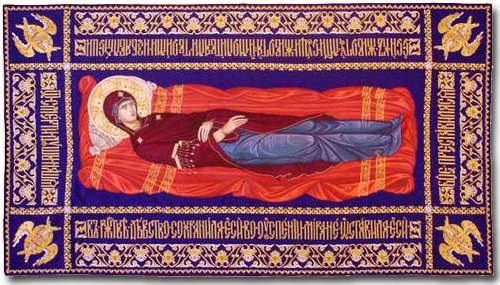 During this coming week our Church will celebrate one of the 12 major feasts of our Church, namely the “Dormition of the Mother of God.” We will also celebrate it, since it is within the octave of the feast, next weekend as a community.
During this coming week our Church will celebrate one of the 12 major feasts of our Church, namely the “Dormition of the Mother of God.” We will also celebrate it, since it is within the octave of the feast, next weekend as a community.
As you may or may not know, while the six major feasts in honor of the Mother of God have special prayers, especially the Hymn to the Mother of God, they do not have special Antiphons but only the other moveable prayers.
The Hymn to the Mother of God, which is prayed during the Anaphora, is most beautiful. It reads:
Seeing the dormition of the Most Pure one, the Angels were filled with awe at how the Virgin went from earth to heaven. In you, O Pure Virgin, the laws of nature were overcome: in giving birth you remained a virgin and in you death heralded life. You remained a virgin after giving birth and remained alive after death, always saving your descendants, O Mother of God.
I would call upon you to reflect upon what we pray on this feast. First, we claim again our belief that her body did not suffer decay but, rather, that she was taken body and soul into the next life after her death. Second, her life-long virginity is again declared, which is one of our solemn beliefs. And last, that physical death is only a proclamation that life is eternal and without end.
The Tropar and Kondak for this feast also is filled with what we believe about life.
TROPAR
O Mother of God, in giving birth You still preserved virginity; and in your falling-asleep you did not forsake the world. You are the Mother of Life and heaven transferred to life, and through your prayers have delivered our souls from death.
KONDAK
The grave and death did not detain the Mother of God. She prays perpetually and is our unfailing hope of intercession; for He Who dwelt in the womb of the Ever-virgin, transferred to life the Mother of Life.
Hopefully my readers can see how our liturgical worship also presents again and again the basic “dogmas” of our religion. We pray what we believe, or at least what we are called to believe by our Church. When we do celebrate this feast next weekend, ask yourself what you truly believe!
